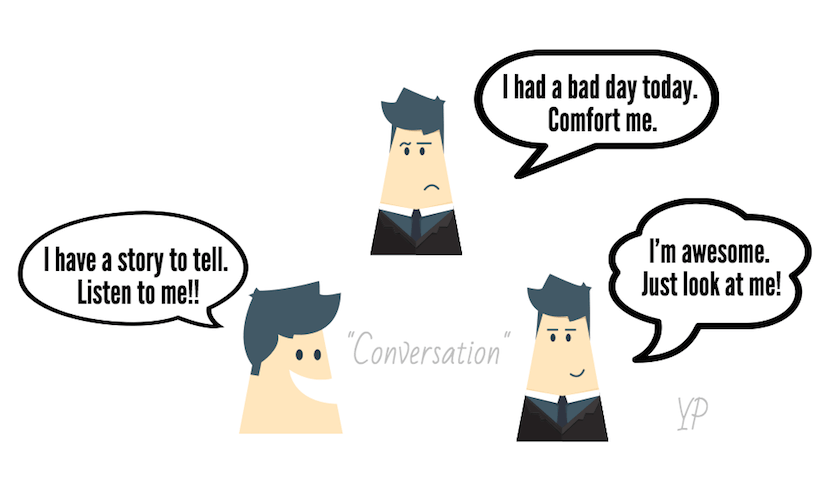Listening 101 is not a course offered in college but definitely should be.
Recently, there have been many talks about the importance of listening in communication, and it’s probably worth paying attention to if psychologists, pastors, motivational speakers, CEOs and ordinary people like myself are talking and/or writing about it. 💁
But really, I believe that listening is one of the most important yet greatly overlooked life skills that need to be addressed and cultivated.
Hear me out:
There’s no doubt that public speaking skills are both desirable and scarce. Colleges know this too– hence the copious classes and courses designed around it.
Indeed, our society applauds great talkers who exude confidence, charisma, and charm with their magic, that is, their words.
“If I were only half as articulate as they are!”
But when it comes down to one-on-one, individual, personal level of communication, I would argue that a great listener is much more attractive than a great speaker. I mean, think about it: a great speaker can inspire with their words, but a great listener can encourage without saying a word!
BTW, if there were enough listeners in the world, a conversation wouldn’t look like the one illustrated above.
Anyhow, I am not at all undermining the importance of speaking in communication: obviously, a conversation involves two or more parties, and at least one of them should be talking (most of the times). But what I do want to emphasize is the importance of listening as an active– not a passive– ingredient in a conversation.
[divider]
So then what makes someone a “good” listener?
“If we were supposed to talk more than we listen, we would have two tongues and one ear.”– Mark Twain.
[divider]
Here are seven ways to develop good listening skills:
[divider]
1- Let the other person speak & don’t interrupt.
We all experience, from time to time, the urge to interrupt the person speaking, either to correct them or to add on to what they’re saying. But resist the temptation! Let the other person finish his or her thoughts– maybe they will address or clarify the point you were going to comment on.
2- Listen with the intent to understand, not with the intent to reply.
Oh, this one got me bad (see Celester Headlee’s “10 ways to have a better conversation” TED talk here). Too many of us, including myself, are so focused on finding keywords that would spark a memory or worried about finding the rights words to “carry on” the conversation. This is not good— focusing on our response means losing the subject in matter.
3- Look at the person speaking.
Yup, listening was never just about listening. Looking at the person while also listening to them ensures a greater concentration and focus because you’re devoting two senses (hearing and sight) to them.
4- Look for non-verbal cues.
👉According to different studies, our words only account for 7% of our communication, whereas our tone accounts for 38% of it, and nonverbal elements (like posture and gesture) 55%.
This suggests that what is unsaid may be more of a communicator than what is said. And indeed, a great listener goes beyond hearing the said. A good listener deciphers the unsaid by observing body languages and facial expressions. A good listener can discern inconsistencies between words spoken and the non-voluntary actions performed.
5- Empathy is key.
As difficult as it is, try to put yourself in the other person’s shoes. Stop trying to relate your circumstance or experience to what that person is experiencing (which usually leads to “been there done that” mentality and attitude) and try to see that person’s experience as a unique event. Then try to feel what the person is feeling.
6- Focus on the message, not the words.
What message is the speaker trying to convey? Are you perhaps being too logical and thus failing to meet their emotional needs? What does the person want you to feel or hope you would do? Try to read between the words.
A great speaker can inspire with words, but a great listener can encourage with no words.
7- (But) be careful not to jump to conclusions.
Reading between the words can help you understand the person’s emotional standing, but be careful not to draw conclusions (unless explicitly stated by the speaker). Always ask before assuming, and offer suggestions before performing them.
[divider]
Takeaways:
- Listening can be more of a communicator (sending messages of empathy, care, and attention) than speaking.
- Listening is not the same thing as hearing. Listening takes more intentionality.
- Listening is all about connection, communication, and context.
[divider]
Serious questions for debate (or some food for thought):
Would you rather be a great talker or a great listener? Would you rather wow people with your speaking abilities or surprise people with your listening abilities? What is more important to you: being looked up to, or being someone people can go to?
[divider]
Suggested reads: 5 Ways to Detach Yourself from Social Media | How to Rebuild Broken Relationships




